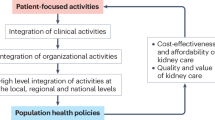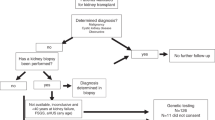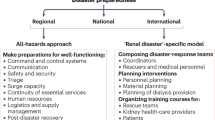Abstract
Research in the field of nephrology continues to improve our understanding of the mechanisms that promote and drive kidney disease, including how human genetic variation might affect disease predisposition and progression. One of the goals of these research efforts is to inform and enable the implementation of precision medicine, whereby patient management is tailored to the individual according to the mechanisms underlying their disease to increase the chances of therapeutic success. To achieve this goal, we need a clearer understanding of the molecular pathways that underlie the many different causes of kidney failure. These research insights are being increasingly translated and implemented into clinical practice. In this Viewpoint, we asked three individuals who have been affected by kidney failure for their views on the importance of understanding the drivers of kidney disease and, on a personal level, what they hope might be achieved with this information.
The contributors
Keith D. Brown is a NIH Kidney Precision Medicine Project (KPMP) Patient Participant and a member of the Steering Committee and Community Engagement Committee. He received his law degree from Gonzaga University in Spokane, Washington, in 1985 and has practised in the area of medical malpractice defence for over 30 years. He served on the Providence Institutional Review Board – Spokane from 2007 to 2019.
Catherine Campbell has been a registered nurse for more than 40 years. Her life purpose is committed to educating and servicing others in health concerns. She has made multiple contributions in volunteer service: as a Patient Participant in the KPMP, an American Association for Retired Persons (AARP) public policy advocate, a Board of Directors member for the Case Management Society of America, a Life Fellows advocate in the American College of Healthcare Executives, Dallas/Fort Worth Community Advisory Board for kidney patient support, an American Association of Kidney Patient advocate and a Governance Committee member for the Sigma Nu Upsilon chapter. In her continued commitment to the nursing profession, she mentors careerists in the American College of Healthcare Executives, as well as doctoral and master nursing students, and delivers online teaching to nursing students attending Mount Saint Mary’s University, Los Angeles.
Glenda V. Roberts is the Director of External Relations & Patient Engagement at the University of Washington Center for Dialysis Innovation (CDI) and the Kidney Research Institute (KRI). She brings the patient voice to a number of NIH/NIDDK government and industry research efforts, as well as the American Society of Nephrology (ASN) COVID-19 Response Team and the ASN COVID-19 Transplant Subcommittee. She is a member of the International Society of Nephrology (ISN), the Kidney Health Initiative (KHI) Patient and Family Partnership Council (PFPC), Can-SOLVE CKD International Research Advisory Committee and Home Dialyzors United Advisory Board, and has been an Ambassador for the American Association of Kidney Patients since 2018. In addition to being a Patient Participant, Glenda is a member of the Steering Committee, the Collaborations Committee, the Return of Results Committee and the Community Engagement Committee, as well as the Director of Communications, for the KPMP.
This is a preview of subscription content, access via your institution
Access options
Access Nature and 54 other Nature Portfolio journals
Get Nature+, our best-value online-access subscription
$32.99 / 30 days
cancel any time
Subscribe to this journal
Receive 12 print issues and online access
$189.00 per year
only $15.75 per issue
Buy this article
- Purchase on SpringerLink
- Instant access to full article PDF
Prices may be subject to local taxes which are calculated during checkout
Similar content being viewed by others
References
Eddy, A. A. Overview of the cellular and molecular basis of kidney fibrosis. Kidney Int. Suppl. 4, 2–8 (2014).
Harbeck, N. et al. Breast cancer. Nat. Rev. Dis. Primers 5, 66 (2019).
Acknowledgements
The KPMP is funded by the following grants from the NIDDK: U2C DK114886, UH3DK114861, UH3DK114866, UH3DK114870, UH3DK114908, UH3DK114915, UH3DK114926, UH3DK114907, UH3DK114920, UH3DK114923, UH3DK114933 and UH3DK114937. The content is solely the responsibility of the authors and does not necessarily represent the official views of the National Institutes of Health.
Author information
Authors and Affiliations
Corresponding authors
Ethics declarations
Competing interests
G.V.R. is employed by the University of Washington, has contributed to the National Palliative Care Grant (patient advisor) and has participated in the following NIH-funded projects: KPMP (Director of Communications), APOLLO (Community Advisory Committee member) and APOL1 (Community Advisory Board member). K.D.B. and C.C. declare no competing interests.
Additional information
Publisher’s note
Springer Nature remains neutral with regard to jurisdictional claims in published maps and institutional affiliations.
Rights and permissions
About this article
Cite this article
Brown, K.D., Campbell, C. & Roberts, G.V. Precision medicine in kidney disease: the patient’s view. Nat Rev Nephrol 16, 625–627 (2020). https://doi.org/10.1038/s41581-020-0319-0
Accepted:
Published:
Issue date:
DOI: https://doi.org/10.1038/s41581-020-0319-0
This article is cited by
-
New clinical trial design in precision medicine: discovery, development and direction
Signal Transduction and Targeted Therapy (2024)
-
The importance of personalized medicine in urological cancers
Journal of Diabetes & Metabolic Disorders (2022)



